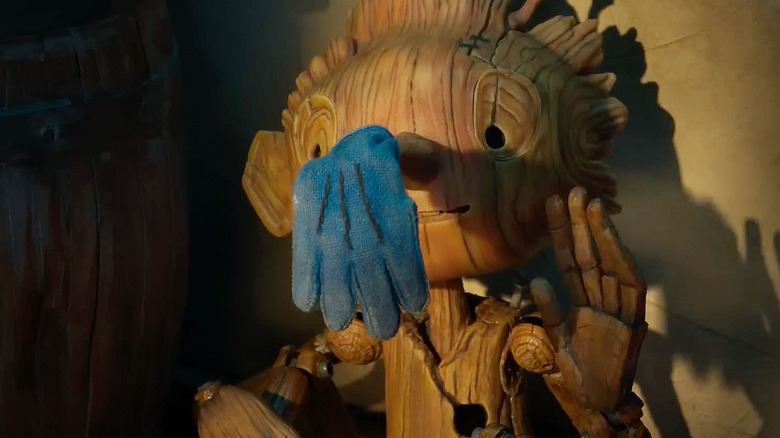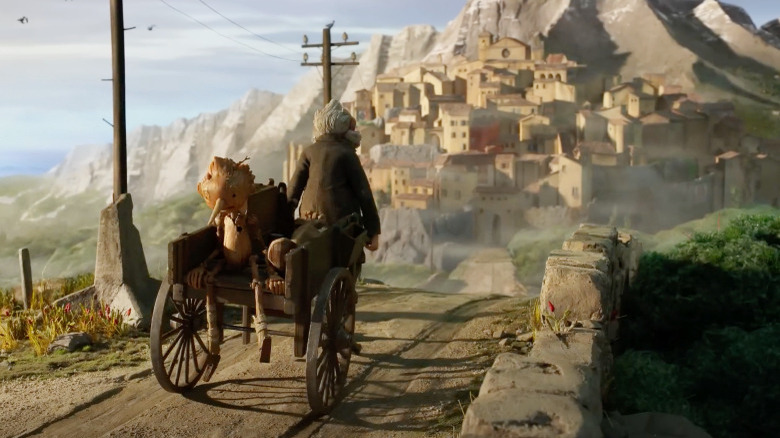Making Pinocchio In Stop Motion Brought Guillermo Del Toro Back To His Roots
Guillermo del Toro's stop-motion "Pinocchio" might be the first animated feature film he's ever called the shots on, but it's far from the only time he's dabbled in the medium. On top of producing DreamWorks Animation's "Kung Fu Panda" movies, "Puss in Boots," and "Rise of the Guardians," del Toro created the "Tales of Arcadia" animated shows (most of which also featured him as a co-writer and director) and paid homage to some of his many influences in the horror genre by helming the "Simpsons" opening couch gag for "Treehouse of Horror XXIV."
Speaking at a "Pinocchio" junket attended by /Film's Jeremy Mathai, del Toro explained that his love of animation (stop-motion in particular) goes back to his early days making films. "My first shorts were stop-motion," he noted, revealing that he had originally wanted to kick off his feature directing career with a claymation movie, even building over 100 "puppet sets" ahead of time. Sadly, however, his studio space was burglarized one night, which resulted in many of the puppets being destroyed and the practical sets being defaced.
As a visual storyteller renowned for his vivid monster effects and detail-oriented production design, it's no wonder del Toro gravitated to animation (and specifically, how it allows his imagination to run wild in ways live-action cannot) from a young age. At the same time, his increasing focus on animated projects over the last 15 years has been about more than just getting back in touch with his creative roots. It's also been a conscious attempt on his behalf to show that animation can be, and always has been, a medium and not a genre.
'Animation is art'
If you're a regular /Film reader, then you know we're always going on and on about the value of recognizing animation as a medium capable of sustaining a wide range of stories, styles, and tones. It's why it's so frustrating when, time and time again, powerful figures in the film industry dismiss animation as being only for kids (which, even in the cases of animated movies that are, in fact, mostly aimed at children, also implies they're inherently inferior or devoid of artistic merit), or the artists who work on them are somehow less specialized than those who tend to work in live-action.
Unsurprisingly, del Toro is very much on the same page as us:
"15 years ago, we started [working on] 'Pinocchio,' and about 10 years ago, I made a vow to start concentrating more and more [on] animation because I want to say it right [off] the top: Animation is film. And animation is art. It is not a genre, nor is it for kids. And it can address serious, deep, moving stories without having to address ... only a [specific] market."
Putting his money where his mouth is, the last 15 years have been seen del Toro working on animated projects running the gamut from martial arts pastiches to epic fantasy adventures, with many of them tackling mature themes while mostly keeping things family-friendly. His "Pinocchio" retelling goes a step further, taking the story from Carlo Collodi's famous 19th-century fairy tale novel, "The Adventures of Pinocchio," and dropping it off in Fascist Italy (circa the 1930s), in the process transforming it into the type of political allegory the "Pan's Labyrinth" and "Shape of Water" filmmaker is so great at telling.
"Pinocchio" begins streaming on Netflix on December 9, 2022.

